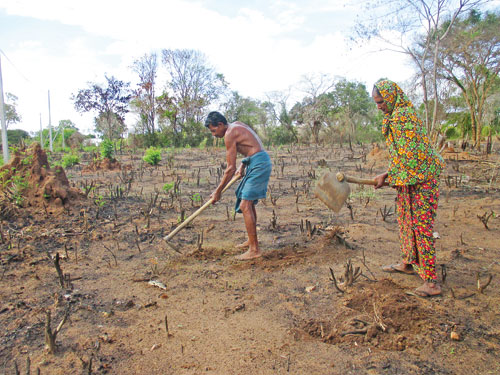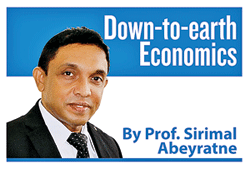“Daylight robberies”
View(s):
Corruption affects everyone including farmers.
I still remember something profound that I learnt during my childhood: “The world is ruled by shame and fear”. Certain things we learnt during our childhood days went deep down in the heart and remained there throughout the lifetime. This wise statement, wherever I learnt it, was the same; it remained to-date at the bottom of my heart like a rock edict.
I am sure I may have not grasped the meaning of it fully at that time. The more I matured and improved my understanding, the greater was the reflection and revelation of this statement: The world is ruled by shame and fear!
Shame and fear
After I witnessed repeated references at both national and international levels to increased “corruption” in Sri Lanka, I can’t think of any reason other than the loss of shame and fear. Corruption is the use of one’s power and authority to gain undue advantage through bribes, commissions, and thefts.
Whenever we use the term “power and authority”, we think of higher levels – politicians, bureaucrats, businessmen and, dealmakers. But power and authority is not limited to higher levels; it remains at every level from top to bottom, while they all know how to create the “environment” which cannot be avoided; as a result, you are automatically sucked into it.
The only difference from top to bottom is the magnitude of the bribe, the commission and the theft; they account for millions and billions of rupees (or even dollars) at higher levels, you may have to deal with fifties and hundreds of rupees at the bottom level.
People may seek such undue advantages because they have no shame and fear! When they lose shame and fear, they are bold enough to demand undue advantage even in broad daylight. Then, it doesn’t matter even if the whole world keeps watching corruption, it is not a shame for those who are engrossed in it.
They don’t have any fear – fear of the society, fear of the law, fear of the life beyond death and, fear of God. For whatever the reason may be, when people have no fear as such, they are not afraid to seek undue advantages.
International references
After seeing a series of references from international agencies on Sri Lanka’s corruption, I thought of addressing this issue with respect to its related economic issues. The most recent references to the country’s corruption came from the international organisations such as the IMF, the World Bank and the United Nations. Almost simultaneously, all these three organisations appear to have referred to corruption in Sri Lanka; but the question is, as a nation do we have a shame or fear about it?
 If we have that shame and fear, I am sure the authorities would have acted differently. But up to now, everything goes smooth as “business as usual”. In the key elements of its Staff-Level Agreement on an Extended Fund Facility (EFF) Arrangement with Sri Lanka, the IMF has clearly mentioned that Sri Lanka must reduce its corruption vulnerability which will be supported by IMF technical assistance.
If we have that shame and fear, I am sure the authorities would have acted differently. But up to now, everything goes smooth as “business as usual”. In the key elements of its Staff-Level Agreement on an Extended Fund Facility (EFF) Arrangement with Sri Lanka, the IMF has clearly mentioned that Sri Lanka must reduce its corruption vulnerability which will be supported by IMF technical assistance.
As the IMF Press Release has outlined, Sri Lanka should improve its fiscal transparency and public finance management by introducing a strong anti-corruption legal framework. Further, an in-depth governance diagnostic should be conducted with IMF assistance. Therefore, Sri Lanka has to adhere to the IMF condition on implementing mechanisms to reduce the country’s corruption vulnerability in order to receive its EFF arrangement.
Internationally
positioned…
According to the Corruption Perception Index of the Transparency International, out of 180 countries, Sri Lanka is ranked at 102nd position in 2021. The Index is based on perceived levels of corruption by the public sector. What is worrying is that among other countries, Sri Lanka’s international position has not improved much in reducing its level of corruption.
Singapore, Hong Kong, Japan are among the least-corrupted countries in Asia, while one South Asian country, Bhutan with its 25th ranking position, is also categorised as one of the least-corrupted countries. Sri Lanka’s lukewarm approach to reducing corruption vulnerability is also evident from the annual reports of the Economic Freedom of the World.
If the corruption vulnerability issue is addressed, apparently the democratic institutions that are responsible for maintaining “rule of law” should have been strengthened. According to the database of the Economic Freedom of the World, Sri Lanka’s institutions related to the maintenance of “rule of law” have never been reformed; these areas include judicial independence, impartial courts, legal enforcement of contracts and the reliability of police.
Rule of law is one of the key pillars on which a market economic system works so that policy reforms are not expected to derive optimal benefits if the rule of law has not been strengthened through reforms. Instead, protecting power is the way of covering up corruption; so that there is always a “power struggle”.
Unexplained wealth
 One of the major tax problems in Sri Lanka has been the lower income tax share, causing lower tax revenue, higher budget deficits and, continued heavy borrowings; they contributed to the country’s current debt crisis and the “over-spending” problem as the source of the crisis. Appropriately, the direct tax revenue share should be in the range of 40 – 60 per cent of the total tax revenue; however, in Sri Lanka it never came to 25 per cent over the past 20 years, while in many years it remained in the range of 15 – 20 per cent.
One of the major tax problems in Sri Lanka has been the lower income tax share, causing lower tax revenue, higher budget deficits and, continued heavy borrowings; they contributed to the country’s current debt crisis and the “over-spending” problem as the source of the crisis. Appropriately, the direct tax revenue share should be in the range of 40 – 60 per cent of the total tax revenue; however, in Sri Lanka it never came to 25 per cent over the past 20 years, while in many years it remained in the range of 15 – 20 per cent.
What’s the point? The countries which follow tax collection efficiently, have also established information systems using technology in order to report people’s income and wealth. Sri Lanka never attempted reporting and recording every person’s income and wealth, while continuing with collecting income taxes in an ad hoc manner.
If such an efficient database had been in place, the government knows who should pay taxes and how much should be the correct amount of tax that every individual should pay. In addition, it would also identify who should receive government support from social security systems such as cash subsidies, unemployment benefits or financial assistance to carry out higher studies.
At the same time, I am sure many would have a problem of explaining and exposing income and wealth in a country with rampant corruption. Perhaps, for the same reason, there has been no significant attempt to use technology and establish an efficient income tax system. As a result, Sri Lanka direct tax collection continued to remain low, while the country’s indirect tax system was too complicated.
It’s only at the Interim Budget that there has been a proposal to register all above 18 years of age with the Inland Revenue Department. However, the final outcome of this proposal will be seen only after it takes off the ground for implementation.
Wealth tax
The countries which attempt to manage public finance more efficiently and effectively also implement a wealth tax system – a tax levied on assets. Taxes as such prevent people over-spending on unproductive assets such as big houses, and act as a buffer for limiting the rise of social inequalities.
Sri Lanka also introduced a wealth tax, the so-called “mansion tax” in 2015 guided by non-economic purposes; but we never heard whether it was implemented or not. However, if Sri Lanka is serious about establishing a corruption-free society, a proper tax system with a better public finance management and advanced technological support has a major role to play.
(The writer is a Professor of Economics at the University of Colombo and can be reached
at sirimal@econ.cmb.ac.lk and follow on Twitter @SirimalAshoka).
Hitad.lk has you covered with quality used or brand new cars for sale that are budget friendly yet reliable! Now is the time to sell your old ride for something more attractive to today's modern automotive market demands. Browse through our selection of affordable options now on Hitad.lk before deciding on what will work best for you!


